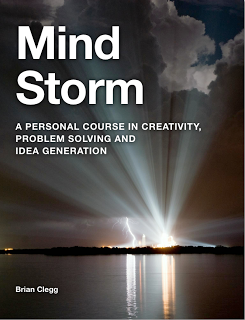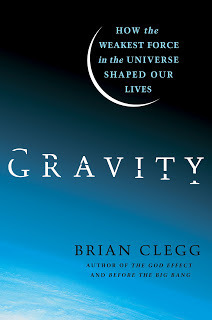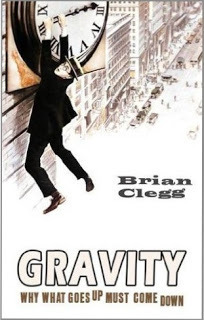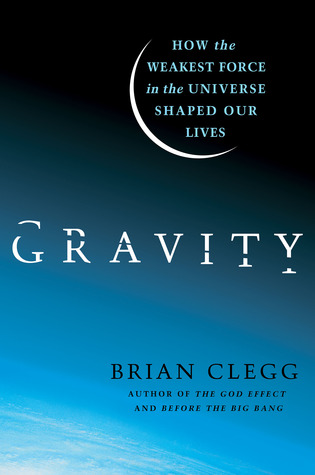Brian Clegg's Blog, page 139
June 28, 2012
Why arty plays will never be popular
 Don't expect much entertainment hereI was listening to James Naughtie on his series about the 'New Elizabethans', being reverential (as he always is about anything arty) about Harold Pinter and his work.
Don't expect much entertainment hereI was listening to James Naughtie on his series about the 'New Elizabethans', being reverential (as he always is about anything arty) about Harold Pinter and his work.There was much discussion of how Pinter's plays represented real life, with all its contradictions, without resolution, without true endings. How it's wonderful that everything is left in the air and unexplained. And it struck me exactly why such theatre isn't exactly commercial.
The fact is, we can all experience real life and real conversations and contradictions and lack of resolution. We can all be left in the air and have things unexplained. It happens every day. That's where we live. We don't need to go to a theatre to experience it. The fact that Pinter encapsulates it wonderfully is a big 'so what?' It makes for theatre that is about as engaging as Big Brother. We don't want to go to a theatre to see real life, we want to be entertained or informed or surprised or excited, or even better all four.
I suspect the minority with a 'literary bent' will continue to be thrilled by Pinter's kind of thing, perhaps because their lives are a lot less real than those of most people. But for the rest of us, I'd much rather we celebrated playwrights who are good at entertaining us, at giving us that delightful, informing, surprising, thrilling evening.
Image from Wikipedia
Published on June 28, 2012 00:04
June 27, 2012
Paying for travel
 There's a lot of debate going on in the UK over the fact that the Chancellor of the Exchequer (isn't that a wonderfully archaic term when you actually look at the words) has announced that he is not going to increase petrol duty by 3p from August, putting it off to January at least.
There's a lot of debate going on in the UK over the fact that the Chancellor of the Exchequer (isn't that a wonderfully archaic term when you actually look at the words) has announced that he is not going to increase petrol duty by 3p from August, putting it off to January at least.Leaving aside the political insults flying about U-turns (get a grip politicians! When are you going to realise that admitting a mistake or the need for change is a good thing?), it has been useful in exposing the debate on what we should do to tax driving. There are two broad needs, to raise revenue (in principle, though not explicitly to pay for the road network and secondary costs thereof) and to discourage use of fossil fuels/high carbon emission activities/pollution.
At the moment there are two weapons in the government's armoury. There is an annual car tax (formerly known as road fund licence), and there is fuel tax. The annual tax is ridiculous. Although it has gradations for emissions, it is still a tax that gets cheaper per mile the more you drive. It is totally counter-functional and ought to be dropped immediately.
As for fuel duty, while it is proportional to the amount you drive and how much of a gas guzzler your car is, it is very heavy handed because it applies equally to someone driving through a crowded, polluted city with a superb public transport system and someone driving in the depths of Cornwall, where the car is an absolute lifeline, the nearest shop is 10 miles away and there is practically no public transport system.
I heard on the radio the other day a Labour person saying what we really needed to do was to go back to the idea of a road pricing scheme, which would monitor exactly where you are driving and charge you accordingly, something the previous government was interested in, but that was squashed because of a ridiculously biassed campaign against it resulting in a huge anti-petition, based much more on emotion than logic.
The trouble is, the Labour plan is also a disaster. It requires far too much technology to work, needing every car to be fitted with a tracking device, and a vast computer system to monitor and collect movement data. It is also hugely Big Brotheresque. There has to be a better way. And there is. Here's Brian's cunning plan to sort out this mess:
Dispose of car tax immediately. This will lose some revenue, though not as much as you might thing as it's quite expensive to administer. If necessary slap on a bit of extra fuel duty.Find a workable way of doing road pricing. The most important thing is that it should be passive - active systems, requiring technology in the car, are too complex and costly. I'd suggest doing it only on motorways, major trunk roads and in cities to keep costs down, using a camera system like the London congestion charge.Once you have the road pricing system, remove the fuel tax entirely.If a load of people whinge about it in a petition, ignore them. You can't always be popular. But if you make it clear that petrol prices will drop by around 70p a litre, people may be more enthusiastic.Successive governments have been too timid about this. Get your act together, guys.
Image from Wikipedia
Published on June 27, 2012 02:48
June 26, 2012
About four inches
 The answer was 'about four inches' - what was the question?
The answer was 'about four inches' - what was the question?Once you have finished sniggering in the back row, the real answer is an unreal pretence of accuracy.
This mini-rant was inspired by a weather forecast, heard on the radio a few days ago for some eastern part of the UK or other. We were told that 100 millimetres of rain was expected 'which is about four inches.'
Now it is perfectly reasonable to say that 100 millimetres is about four inches, as it is actually pretty close to 4.16 inches. But the point is that there weren't really going to be 100 mm of rain.
In reality that '100 mm' number was just a round figure guess. There was no significant accuracy to the value. So the inches version should be a round figure too - in this case, four inches, not 'about four inches'. Otherwise it suggests a totally spurious accuracy in the original 100 millimetres.
When I worked for a certain large airline with the initials BA, we used to have a similar problem with the people involved in scheduling aircraft. The planning system included various variables, like passenger load, and we worked out the weight of the total passengers on board (because that influences the amount of fuel you need) using an average figure. One of our planners wanted us to change the system so he could put in passenger weights to two decimal places. But given this was a vague estimate, such accuracy was worse than meaningless: it gave the figures a spurious reality.
And that's why I'm picking up the weather forecaster highly unfairly on what was actually a very natural thing to say. It's just too easy to give a forecast figure, which in the end is an informed guess, a spurious sense of accuracy, and we need to be on our guard to avoid this.
Image from Wikipedia
Published on June 26, 2012 00:33
June 25, 2012
Mind Storm
 Creativity in business is a funny thing. We all pay lip service to how important it is - but when times are tight and money is short we tend to pull up the drawbridge and say 'We can do without all this new-fangled innovation. While we're in trouble we need to stick with what we know.'
Creativity in business is a funny thing. We all pay lip service to how important it is - but when times are tight and money is short we tend to pull up the drawbridge and say 'We can do without all this new-fangled innovation. While we're in trouble we need to stick with what we know.'In reality, of course, this is absolute tosh. The very time when you need to be most creative as a business is when things are difficult. But it's understandable that, in times of financial stress, you don't necessarily want to spend lots of money to train people in being more creative.
There's an assumption in that previous sentence, of course. I'm taking it for granted that there is benefit in training people in creativity. I hope there's no doubt about the need for creativity. If everything around you stayed exactly the same, then you could carry on as you have before and thrive. But the fact is that the environment (financial and physical) is changing. Your customers are changing. Your competitors and your industry are changing. Techology is changing. You need creativity for new ideas, and you need it to solve problems. I think it's no exaggeration to say that in this environment, creativity is nothing less than a survival essential. It's a case of be creative or go to the wall.
However, is there any point in training people in creativity? Haven't they either got it or not? And what can you possibly do? Give them a pot of paint and say 'Get creative?'
In fact, there is a huge point. Everyone can be creative, but most of us suppress that natural ability. We block it in ourselves and in others. We're great at doing this. (If you doubt that statement, next time you are in a meeting, watch out for someone coming up with an idea, then see how everyone else finds reasons why it won't work.) And in the last few decades practical techniques have been developed that will enable anyone to come up with a much richer pool of ideas, and help them to develop and implement those ideas effectively. We're not talking about airy-fairy conceptual creativity, but down-to-earth, practical tools that solidly deliver ideas and problem solutions.
So, creativity training, good - cost of creativity courses, bad. If your business has the money, I would still get yourself a proper course. You can't beat the interaction with a good creativity trainer to get people up and running with creativity quickly. But if the budget doesn't run to it, I've put together a simple, self-managed 25 module course in the form of a PDF ebook called Mind Storm that won't break the budget at £19.99.
To get a better feel about what's involved, the first chapter of the book is available to download for free - or you can find out more details and purchase the full course here.
I really think, given the current conditions, any business that isn't doing something about its creativity is asking for trouble.
Published on June 25, 2012 00:33
June 22, 2012
Funny business on the price tag
 Have you ever wondered about those strange prices that dominate the retail world? It's not £5, it's £4.99. Forget £10, it is bound to be £9.99. Just occasionally a retailer will rebel. For a brief bizarre period around 10 years ago Asda experimented with pricing CDs and the like with prices that ended with numbers like .74 or .27 - it looked much stranger than you might expect, so engrained is the notion that .99 is what nature intended.
Have you ever wondered about those strange prices that dominate the retail world? It's not £5, it's £4.99. Forget £10, it is bound to be £9.99. Just occasionally a retailer will rebel. For a brief bizarre period around 10 years ago Asda experimented with pricing CDs and the like with prices that ended with numbers like .74 or .27 - it looked much stranger than you might expect, so engrained is the notion that .99 is what nature intended.I think there is little doubt that the reason that retailers do this is psychological. We aren't hugely rational when it comes to decisions, especially when they involve those alien things numbers, which didn't exist as concepts when our current brain structure first evolved. So it doesn't matter how much you consciously tell yourself that £10 is pretty much the same as £9.99, your unconscious, shopping-powering mind will see it as considerably less. And it helps if you have to describe your purchase to a penny-pinching other half. 'It was only £9,' you can say, simply not specifying your rounding rule (and who would).
Interestingly, though, a book I'm currently reading for review suggests that the practice of using these trailing .99s predates the awareness of such psychological factors. According to The Universal Machine by Ian Watson, this practice originated with the first cash registers. These were designed to prevent the salespeople ripping off shop owners by clearly registering a transaction and by ringing a bell so the supervisor could see the assistant drop the money into the till.
Apparently the theory was that if you had something priced at £5 then you could be handed a £5 note which you slipped into your pocket and as far as the shop was concerned, the item had been stolen by a shoplifter, while you were £5 better off. But if the item was priced at £4.99 you would almost inevitably have to give change, making it necessary to 'ring up' the item and be under your supervisors scrutiny.
So there you go £4.99? It's surprising how much you get for it.
(The full review of The Universal Machine will be posted on www.popularscience.co.uk in a few days time.)
Image from Wikipedia
Published on June 22, 2012 01:36
June 21, 2012
Surely this is madness? No, sir, 'tis mine art
I was listening to some Shakespearian actor Johnnie on the radio yesterday morning talking about an arts event that is being arranged in London for the Olympics. Apparently he and 49 other actorrrrs (sic) will be spontaneously weaving quotes from Shakespeare into encounters with the public. Apparently he is a little worried about doing it himself, because people will recognise him. (He shouldn't worry, I've never heard of him, let alone know what he looks like. I think he rather overrates his fame.)
But here's the thing - when he described what would happen, it didn't so much sound like art as letching. I paraphrase from memory, but this is roughly what he said might happen.
I can just imagine the meeting where someone dreamed this up. 'Oh, daaaarling (sic), wouldn't it be wonderful? The common proles could hear the language of Shakespeare without us having to get them into an overpriced theatre seat, which they can't afford once they've paid for their bingo and whippets. It would so good for them. They'll just lap it up.'
I remain to be convinced.
But here's the thing - when he described what would happen, it didn't so much sound like art as letching. I paraphrase from memory, but this is roughly what he said might happen.
I might sit next to someone on a park bench and say 'Hello, it's a nice day,' and then 'That's a nice bracelet... Shall I compare thee to a summer's day? Thou art more lovely and more temperate. Rough winds do shake the darling buds of May, And summer's lease hath all too short a date.'Now, I'm sorry, but if someone did this to me, or the equivalent - I can't see anyone comparing me to a summer's day (more like 'This misshapen knave - His mother was a witch') - I would at best be moving away rapidly and at worst calling the police. This isn't art, it's harassment.
I can just imagine the meeting where someone dreamed this up. 'Oh, daaaarling (sic), wouldn't it be wonderful? The common proles could hear the language of Shakespeare without us having to get them into an overpriced theatre seat, which they can't afford once they've paid for their bingo and whippets. It would so good for them. They'll just lap it up.'
I remain to be convinced.
Published on June 21, 2012 00:50
June 20, 2012
Royal Society Winton Prize
 It's a lazy post today. The long list has been announced for the 2012 Royal Society Winton Prize for Science Books (though I don't know what Dale Winton has to do with it). Take a look at my post on it at www.popularscience.co.uk with links to reviews of the listed books we've had in so far, plus the all-important set of the books that should have been on the list but were overlooked.
It's a lazy post today. The long list has been announced for the 2012 Royal Society Winton Prize for Science Books (though I don't know what Dale Winton has to do with it). Take a look at my post on it at www.popularscience.co.uk with links to reviews of the listed books we've had in so far, plus the all-important set of the books that should have been on the list but were overlooked.To be fair, you really have to feel a bit sorry for the judges. They had to somehow whittle down a pile of over 100 books to 12, which is a horrendous task.
Oh, the excitement.
Published on June 20, 2012 00:39
June 19, 2012
So long, farewell
 The means we have for communicating in writing have blossomed over the last couple of decades. When I was at university it was letters or telegrams. We may have lost those exciting little brown envelopes that brought news of disaster and triumph, but we've added email, text messaging and so much more. Which leads me to ponder the ways we sign off when writing.
The means we have for communicating in writing have blossomed over the last couple of decades. When I was at university it was letters or telegrams. We may have lost those exciting little brown envelopes that brought news of disaster and triumph, but we've added email, text messaging and so much more. Which leads me to ponder the ways we sign off when writing.In formal letters it's easy - Yours sincerely if it's a named person you are writing to and Yours faithfully if it's not. But informal letters and particularly these quicker, easier means of written communication of today bring with them a whole host of options for how to end. Even text messages have this: do you end with a kiss or not? My (female) family expect this. In fact the number of kisses acts as a kind of emoticon. No kisses - you're in trouble. One or two - ordinary communication. Lots of kisses - either 'I want something' or 'Thank you so much!' But those kisses are so dangerous. Because 90+% of my texts are to said family members it's so easy to nearly add a kiss to a text to a business colleague, or to a tweet, where it simply isn't what I want to do.
And then there are the endings for emails and other longer communications. They too carry a hidden baggage of subtle secret messages. Here is my attempt to decode them:
Best regards - Straightforward, neutral sign offKindest regards - I don't really know you, but I want to appear rather formally pleasantGet stuffed - This is probably the end of our conversationBye - In a hurry, but want to appear chatty and friendlyCheerio - Just off to have a picnic, washed down with lashings of ginger beerBest wishes - We aren't just business colleagues, we are social colleaguesCheers - I know we're quite close, but it would be embarrassing to say anything elseAll the best - One of my favourites: an affectionate farewell without being sloppyLove - For girliesLots of love - For people you fancy or very close familySo there we have it. It's quite difficult to end anything, letter or email or even blog post.
Keep smiling,Brian xx
Published on June 19, 2012 01:00
June 18, 2012
Defying gravity

I'm delighted to announced that my new book Gravity - How the weakest force in the universe shaped our lives is now available in the US. (UK readers, the proper UK version is out on 25 October, but if you can't wait that long, there are some copies of the US version on Amazon, and the UK link from my website will point to that until the official US version is out.)
I have recently done a few relatively light topic books, which is hugely enjoyable to do (and, I hope, to read), but it's nice to get your teeth into something meaty, and it's interesting that my best selling physics-based book remains The God Effect on quantum entanglement, one of my more challenging titles. The great thing about doing the book on gravity is that it's a subject that is very obvious - you can avoid the effects of gravity in everyday life - and yet for most of human existence it has been quite mysterious.
Then, when you get onto general relativity it becomes even more fascinating, and if you don't try to do the maths (which you'll be pleased to know I don't), it is still surprisingly approachable. I've gone into more depth in general relativity than I've seen before in a popular science title, but I really think its worth it, as it gives you a chance to explore, for instance, why frame dragging, the effect that is used in conceptual general relativity time machines, exists.
 For light relief there is the whole anti-gravity business. There's a hilarious mid-20th century article on how the world will be transformed by anti-gravity (quite serious), there are the real scientific attempts to counter gravity... and the sometimes delightful amateurs. Not to mention the conspiracy theories.
For light relief there is the whole anti-gravity business. There's a hilarious mid-20th century article on how the world will be transformed by anti-gravity (quite serious), there are the real scientific attempts to counter gravity... and the sometimes delightful amateurs. Not to mention the conspiracy theories.All in all, I think this is a book that should go down well - and I think it's the best cover St. Martin's Press has ever done for me (the blue one at the top of the page). I've also included here the UK cover from Duckworth, which I think is great fun, though I'm not so sure about the subtitle, which no one consulted me about.
If you are on Goodreads, I've a free copy on offer - see the link at the bottom of the page. To finish off, here's a few fun factoids from Gravity:
The gravitational attraction of the midwife is a stronger effect than that of the planets – so basing astrology on gravity is problematicThanks to a project sponsored by KFC we know that birds eggs don’t develop in zero gravity, as the yolk needs to be kept near the shellOriginally gravity was paired with levity, the tendency light things have to move upwardsSurprisingly, Galileo’s famous observation that pendulums swing with the same frequency however far they swing is wrong. It only applies for small swingsNewton’s ideas on gravity were called ‘occult’ by his contemporaries because he referred to ‘attraction, and the only meaning for the word was the attraction between people – he seemed to be saying the Moon orbits the Earth because they fancy each otherIf you fire a bullet horizontally and drop a bullet from the same height at the same time they will both land at the same timeIf there was water on the Moon the tides would be dramatic – 80 times the size of those on the EarthIf you fall through a hole dug from point to point on the Earth (e.g. from one side to the other) it takes 42 minutes to fall throughThe gravity on the International Space Station is around 90 percent Earth normal – but they don’t feel it because they are constantly falling and accelerating towards the EarthThe famous experiment that ‘proved’ general relativity right by measuring the deflection of starlight round the Sun in a total eclipse in 1919 was fudged to get the right results (though it has since been proved)Relativity made Einstein such a media star he was asked to appear for a season at the London Palladium, explaining his theories. He politely declinedFor five decades, millions of dollars have been spent on a whole range of experiments to detect gravity waves but as yet not a single one has been detectedThere is no evidence to support conspiracy theories about antigravity technology – we know all about stealth technology, which doesn’t have commercial applications – antigravity would inevitably ‘escape’ from the military sphere it if it existedIt is possible that antimatter is repelled by gravity rather than attracted – we have never had enough of it to measure the effect .goodreadsGiveawayWidget { color: #555; font-family: georgia, serif; font-weight: normal; text-align: left; font-size: 14px; font-style: normal; background: white; } .goodreadsGiveawayWidget img { padding: 0 !important; margin: 0 !important; } .goodreadsGiveawayWidget a { padding: 0 !important; margin: 0; color: #660; text-decoration: none; } .goodreadsGiveawayWidget a:visted { color: #660; text-decoration: none; } .goodreadsGiveawayWidget a:hover { color: #660; text-decoration: underline !important; } .goodreadsGiveawayWidget p { margin: 0 0 .5em !important; padding: 0; } .goodreadsGiveawayWidgetEnterLink { display: block; width: 150px; margin: 10px auto 0 !important; padding: 0px 5px !important; text-align: center; line-height: 1.8em; color: #222; font-size: 14px; font-weight: bold; border: 1px solid #6A6454; -moz-border-radius: 5px; -webkit-border-radius: 5px; font-family:arial,verdana,helvetica,sans-serif; background-image:url(http://www.goodreads.com/images/layou... background-repeat: repeat-x; background-color:#BBB596; outline: 0; white-space: nowrap; } .goodreadsGiveawayWidgetEnterLink:hover { background-image:url(http://www.goodreads.com/images/layou... color: black; text-decoration: none; cursor: pointer; } Goodreads Book Giveaway

Gravity by Brian Clegg
Giveaway ends July 06, 2012. See the giveaway details at Goodreads.
Enter to win
Published on June 18, 2012 01:24
June 15, 2012
On the Evolutionary Road to Damascus - 5
 This is the fifth and last in my series of linked blog entries on my experience of being converted (or not) to intelligent design.
This is the fifth and last in my series of linked blog entries on my experience of being converted (or not) to intelligent design.The final evidence provided to me is from the DVD 'Where does the Evidence Lead'. Like my first source, the book "What's Darwin Got to do with it?": this is a calm, reasoned argument for intelligent design, rather than a religious rant.
I don't think the DVD provides any additional arguments, going over the same material slowly with pictures. Once again, I am convinced that the reasonable inference argument means that ID needs at least considering, but that there just isn't enough evidence to unseat evolution.
This DVD majors on the bacterial flagellum as impossible to explain without design. We are told that no one can explain how the various different components could have evolved, as none is useful independently. Unfortunately, it appears that the only source for this assertion is the champion of the motor, Michael Behe (who appears prominently on the video). There are good examples already of many of the components of the flagellar motor in action elsewhere. This was highlighted in the 2005 Pennsylvania court case.
So, sadly, nothing more added here.
The outcome of my trip through this material? I am more sympathetic to intelligent design than I was. Because I know it has been used as a 'stalking horse' by some creationists I was suspicious of it, but frankly this is an ad hominem attack, which was unscientific of me. It doesn't matter why someone puts a theory forward if it has some merit.
There is enough in nature that is suggestive of design to make it worth investigating as a scientific thesis - however, there appears to be no good evidence to accept the design theory, and everything to stick with evolution. This doesn't mean evolution shouldn't be challenged - it always is being - and it doesn't mean we can rule out design - but it has to remain a minority theory to be kept in mind but not in a fit state to challenge mainstream thinking.
POSTSCRIPT - When I thought I was finished, a book called Dissent over Decent dropped onto my review pile. Subtitled 'intelligent design's challenge to darwinism' I thought it might give me a final conclusion. Unfortunately it's a philosophy (or possibly sociology) of science book, so very woffly and intensely dull. I think its conclusions were that both ID and evolution are scientific theories (in that they try to offer an explanation for the existence of something), but both are bad science (because neither can offer any useful predictions about a specific species etc.) So I got nothing useful here, apart from reinforcing my prejudices about philosophy/sociology of science - but that's a whole new debate which I will leave to another day.
Published on June 15, 2012 01:17



